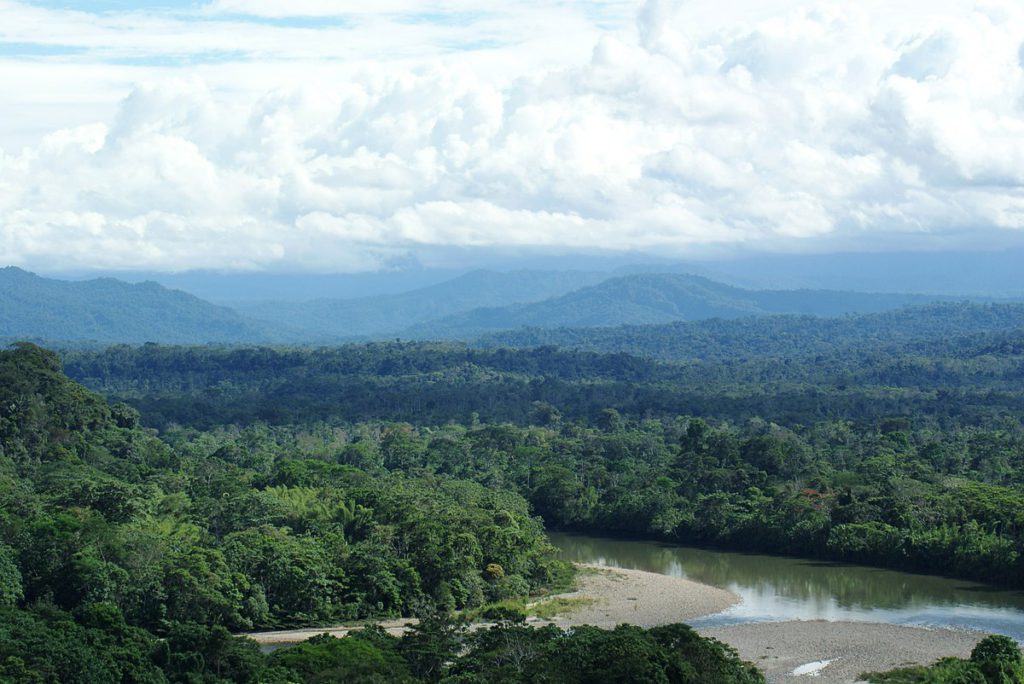Reuters | September 6, 2022 |

Ecuadorian Amazon rain forest, looking toward the Andes.
Credit: Wikimedia Commons
Two indigenous communities from Ecuador’s Amazon region on Tuesday demanded the Constitutional Court enforce rulings from 2018 and 2019 to protect thousands of hectares (thousands of acres) of tropical jungle from oil and mining projects.

Local courts in Ecuador ruled separately in favor of the A’i Cofan community of Sinangoe, in the country’s Sucumbios province, as well as 16 Waorani communities in Pastaza province, arguing they had not received prior consultation concerning extractive projects slated for their territories, even ordering restoration work in affected areas.
Delegations from both communities presented a case to Ecuador’s Constitutional Court to force the ministry of energy and mines, and the environment ministry, to comply with the rulings.
“It’s been several years but the sentence has not been carried out at all,” Wider Guaramag, president of the A’i Cofán Community of Sinangoe, told journalists. “The violation of our rights continues.”
In 2018, a judge ruled in favor of the A’i Cofan community and ordered the reversal of some 20 mining concessions granted to private companies along the Aguarico River, as well as the archiving of 32 processes that had not yet been awarded.
However, the community argues that authorities only suspended the mining concessions, without reversing or archiving them, while environmental restoration has not been carried out.
Activities at 146 mining concessions have been suspended in Ecuador in the last 15 months, the environment ministry said in a statement, without mentioning the concessions in Sucumbios.
The Waorani communities are seeking protection for their territories, to prevent oil operations being developed on their lands, after a judge ruled the creation of oil block 22 violated their rights in 2019
The oil block in question has not been awarded to an oil company yet.
The ministry of energy and mines did not immediately respond to requests for comment.
“We want answers because it has been years,” Gilberto Nenquimo, president of the Waorani nation, told journalists. “They must carry out the ruling.”
(By Alexandra Valencia and Oliver Griffin; Editing by Sandra Maler)
Two indigenous communities from Ecuador’s Amazon region on Tuesday demanded the Constitutional Court enforce rulings from 2018 and 2019 to protect thousands of hectares (thousands of acres) of tropical jungle from oil and mining projects.

Local courts in Ecuador ruled separately in favor of the A’i Cofan community of Sinangoe, in the country’s Sucumbios province, as well as 16 Waorani communities in Pastaza province, arguing they had not received prior consultation concerning extractive projects slated for their territories, even ordering restoration work in affected areas.
Delegations from both communities presented a case to Ecuador’s Constitutional Court to force the ministry of energy and mines, and the environment ministry, to comply with the rulings.
“It’s been several years but the sentence has not been carried out at all,” Wider Guaramag, president of the A’i Cofán Community of Sinangoe, told journalists. “The violation of our rights continues.”
In 2018, a judge ruled in favor of the A’i Cofan community and ordered the reversal of some 20 mining concessions granted to private companies along the Aguarico River, as well as the archiving of 32 processes that had not yet been awarded.
However, the community argues that authorities only suspended the mining concessions, without reversing or archiving them, while environmental restoration has not been carried out.
Activities at 146 mining concessions have been suspended in Ecuador in the last 15 months, the environment ministry said in a statement, without mentioning the concessions in Sucumbios.
The Waorani communities are seeking protection for their territories, to prevent oil operations being developed on their lands, after a judge ruled the creation of oil block 22 violated their rights in 2019
The oil block in question has not been awarded to an oil company yet.
The ministry of energy and mines did not immediately respond to requests for comment.
“We want answers because it has been years,” Gilberto Nenquimo, president of the Waorani nation, told journalists. “They must carry out the ruling.”
(By Alexandra Valencia and Oliver Griffin; Editing by Sandra Maler)
No comments:
Post a Comment